
Oct. 24, 2025
Mizzou scholars spearhead multidisciplinary research on team dynamics, knowledge exchange
Here’s light-hearted take on a real doctoral retreat and how it might look as an article in a completely fictitious academic journal.
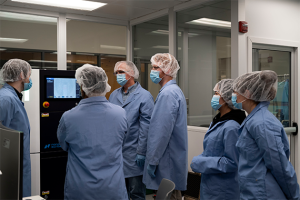
Jan. 9, 2024
Mizzou Engineering secures Nanoscribe Quantum X Shape 3D printer
Purchased with nearly $1 million from a U.S. Army Engineer Research and Development Center (ERDC) grant, the Quantum X shape from Nanoscribe, a Bico company, uses a process called two-photon lithography to rapidly cure a liquid resin, making it ideal for rapid prototyping and wafer-scale processing of any 3D shape. It’s the fastest and most accurate 3D printer for high-end microfabrication tasks on the market. Mizzou Engineering is one of just a few U.S. organizations to have the printer in and one of fewer than 100 around the world.
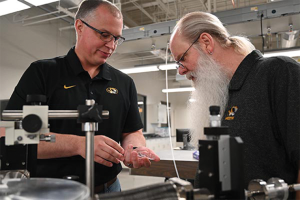
Aug. 23, 2023
NSF Research Traineeship program to prepare materials and data scientists
A five-year, $3 million grant from the National Science Foundation (NSF) is establishing a doctoral training program at the University of Missouri to help prepare the next generation of scientists and engineers to work in the emerging fields of materials science and data science and analytics.
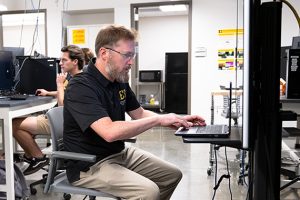
July 10, 2023
Longtime AI researcher stays grounded as new bots turn field upside down
Generative artificial intelligence (AI) systems such as ChatGPT can provide a lot of convincing answers to user queries. What these models can’t do so well is explain how they derived their result and how confident they are in the output. And large language models (LLMs) aren’t the only machines making decisions that impact us. Professor Derek Anderson has been studying complex issues around AI for 20 years.
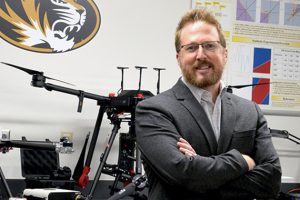
April 6, 2023
AI innovator mentors next generation while breaking new ground
AI is at the forefront of everyone’s mind, and Associate Professor Derek Anderson is at the forefront of AI.

Jan. 11, 2023
Team using artificial intelligence to revolutionize infrared sensors
With funding from the U.S. Army, a Mizzou Engineering team and collaborators are using artificial intelligence in hopes of revolutionizing infrared sensors.
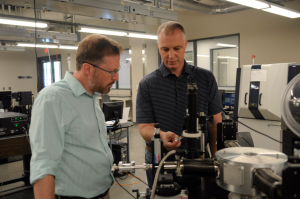
May 17, 2022
How to build an ‘explainable AI’ framework to speed up the innovation process
A nearly $4.9 million grant from the U.S. Army Engineer Research and Development Center (ERDC) is supporting the project by University of Missouri engineers.